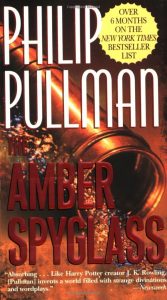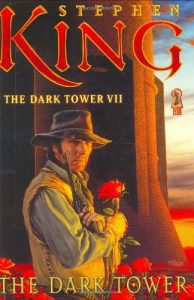 All things considered, I’d rather live in the parallel universe where Philip Pullman wrote a better conclusion to his fairly nifty parallel universe trilogy, His Dark Materials.
All things considered, I’d rather live in the parallel universe where Philip Pullman wrote a better conclusion to his fairly nifty parallel universe trilogy, His Dark Materials.
I suppose I’m obligated to say more.
So, despite my continued enjoyment of the main characters and their struggles, most of what’s left went way, way downhill at the end. The Church badness got more cartoonish than ever. The climactic battle was barely a battle and in no way climactic (although it did have a satisfying Cost associated with it). Dangers to the characters were consistently resolved in deus ex machina ways, which is incredibly ironic in this particular plot. Several interesting things happened, but seemed to be only tenuously related to the previous two books of storyline. And even now, I have no clear idea who He is, nor what His Dark Materials are, or whether I should be concerned about them, happy, or something else entirely.
Could some of this be my problem and not the author’s? Sure, I suppose it could be. But I like my odds. I’m inclined to say that two books were squashed into one to achieve trilogy status. Which I suppose is a nice change from one book being extended to three, but ultimately, the reader suffers either way. One book in one book’s worth of pages, please.
I did like the titular amber spyglass and in fact the entire storyline associated with it. Except for the part at the end, where Lyra is supposed to be tempted like Eve was. I think I can cobble together a pretty good explanation of the temptation, the choice, the outcome, and all that, but I disapprove of the fact that it didn’t play out the way it was prophesied to earlier in the book, because it left me thinking that the point of the whole series had never actually occurred. There I was, waiting for event X, and event Y happens instead, the book ends, and I have to spend the next day or so working out that, no, that really was what he meant, he just forgot to write the part where it was in any way related to the characters I had been promised would be involved.
Looking up, I feel like I ought to include spoiler protection, except that if it never happened, how can it be a spoiler? And also except for the fact that the above is a jumbled, barely literate mish-mash of words that mean essentially nothing, and will probably even confuse people who have read the book, much less people who haven’t. If it helps any, this matches my own state of mind when I passed the climactic chapter and reached end-story land. Without the story, y’know, ending.
(Also, I was not particularly satisfied with how the story did end, but that is not the fault of the author and so falls outside the boundaries of this particular review. I can easily see how it could be satisfying to people who are not me.)
 I’m having a tough time with this one. Obviously in part because it’s the last book of a series. Also because it’s (apparently) Stephen King’s last book in general, and I have a lot of respect for the guy.
I’m having a tough time with this one. Obviously in part because it’s the last book of a series. Also because it’s (apparently) Stephen King’s last book in general, and I have a lot of respect for the guy.